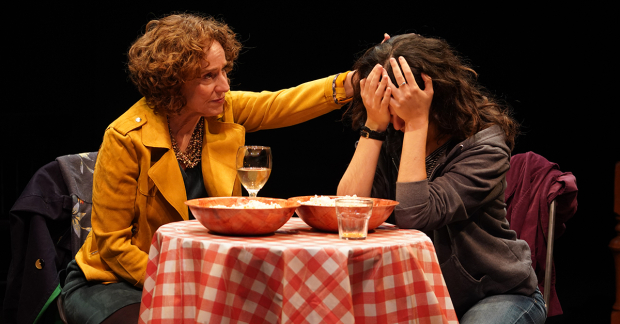Review: An Extended Conversation Worth Eavesdropping On in The How and the Why

(© Carol Rosegg)
First produced by the McCarter Theater Center in Princeton, New Jersey, in 2011, Sarah Treem's The How and the Why makes its New York City premiere at the Sheen Center through the company Good Egg, more than a decade later during a sociopolitically interesting time. By "interesting" I mean, of course, fraught and even frightening. The Supreme Court's recent overturning of Roe v. Wade has put a woman's right to bodily autonomy in more jeopardy than ever before, thus offering a fascinating extra-textual backdrop for a two-hander about two generations of women scientists confronting stark differences in feminist perspective and life experience while contemplating fundamental questions about reproductive behavior.
The title of Treem's play, as Rachel (Arielle Goldman) explains, comes from evolutionary biologist Ernst Mayr in boiling down the two basic perspectives from which all biologists approach the issues they're studying: the ways things happen ("how") and the reasons they happen in the first place ("why"). The main issue that obsesses Rachel is menstruation: specifically why women are subjected to periods in the first place. Her theory — that periods are defense mechanisms against the toxicity of sperm — is a truly radical one. Or so it seems to Zelda (Karen Leiner), the older scientist to whom she explains her thought process, and who, a generation earlier, conceived of the "grandmother hypothesis," which suggested an evolutionary reason for why women continue to live long past menopause.
The reason Rachel is meeting with Zelda, however, is more personal in nature, as is gradually revealed over the course of the two conversations that make up Treem's play. We eventually discover that Rachel is, in fact, the adopted daughter of Zelda, whom she gave up to pursue her scientific work. But more than just being about scientific and familial questions, The How and the Why is also about differences between generations. Whereas Rachel is a generally ultra-progressive millennial who, among other things, questions the institution of marriage, Zelda still holds on to some more traditional ideas about not only marriage, but feminism in general, especially regarding how to navigate the still-male-dominated field of science.
Treem — best known for her television work as a co-creator of The Affair and a writer for In Treatment — infuses these two characters with enough detail for the play to be compelling even at its most jargon-filled. That isn't to say she isn't above some distinctly writerly plot manipulations here and there: Certain revelations in the second half feel less organic to these two individuals than borne more out of a misguided need for heightened drama. And yet, even such failures aren't enough to dull the edge of the genuinely provocative issues their conversations raise and the pathos of the challenging emotions these characters' pasts and presents dredge up.
Treem's writing is also sharp enough to transcend some of director Austin Pendleton's rather odd staging choices. Rachel may describe Zelda's office as "very masculine," a characterization that Treem echoes in her own stage directions. That doesn't necessarily come across in Anya Klepikov's minimalist set design, though, however elegantly and intimately lit by Ryan Metzler. Pendleton's blocking of the dive-bar-set second half also occasionally strains credulity (his decision to have Leiner get up and grab two batches of popcorn in the middle of the scene briefly took me out of the scene). Most baffling of all is his use of bright flashes of light to demarcate ostensible moments of insight for both characters (one for Rachel in the first scene, one for Zelda in the second), but which only serve as momentary distractions instead.
At least Pendleton doesn't get in the way of his two performers. Though Leiner, at least at the preview performance I attended, still evinced a slightly shaky handle on her lines, she nevertheless nails the vibe of a slightly aloof, reflective personality who has lived long and hard with the choices she has made in her life. By contrast, Goldman is commandingly youthful, open, and vulnerable playing a character with strong opinions who is nevertheless still taking some uncertain first steps in navigating the scientific world. All by themselves, they make the talk in The How and the Why feel genuinely weighty and full of import: an extended conversation worth eavesdropping on.










